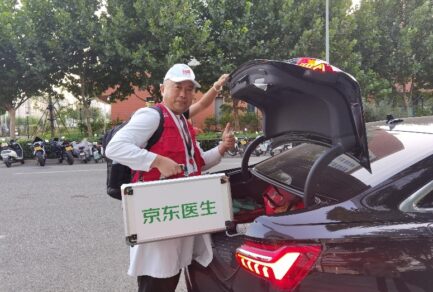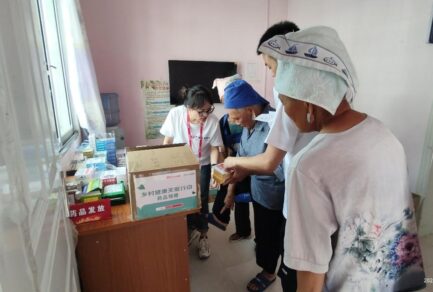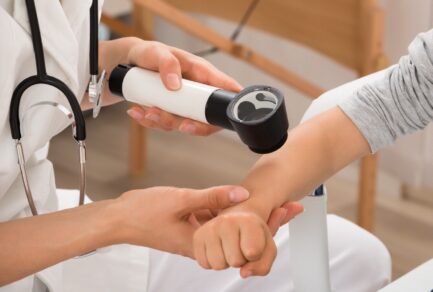Apr 22, 2021|
In-depth Report: Pursuing the Broader Future of Intelligent Medical Services
by Hui Zhang
In a speech to more than 1,000 colleagues after the ceremony of JD Health listed on the Hong Kong Stock Exchange in late 2020, CEO Lijun Xin specifically highlighted Dongyuan Wang, general manager of JD Health’s Intelligent Medical Services department, as a true professional whose extensive understanding of pharmacy medical services perfectly match with JD Health’s business needs.
Her track record speaks for itself. Within one year after Wang joined JD Health in 2018, her team became profitable and has continuously achieved various milestones. “I am grateful to Xin for giving me the opportunity to work here and pursue my goals,” said Wang.
She has led her team in partnership with the Third Hospital of Peking University to create an AI-based prescription review and analysis system, and cooperated with Tianjin Nankai Hospital to build the Nankai JD Internet Hospital during the pandemic. Additionally, JD Health launched its first Internet hospital for Traditional Chinese Medicine (TCM) in cooperation with the First Affiliated Hospital of Henan University of Chinese Medicine. Leveraging JD’s big data, AI, 5G among other technologies, Wang also led her team to promote the construction of “Health City” projects in several cities including Beihai in Guangxi, Taicang in Jiangsu and Hebi in Henan.
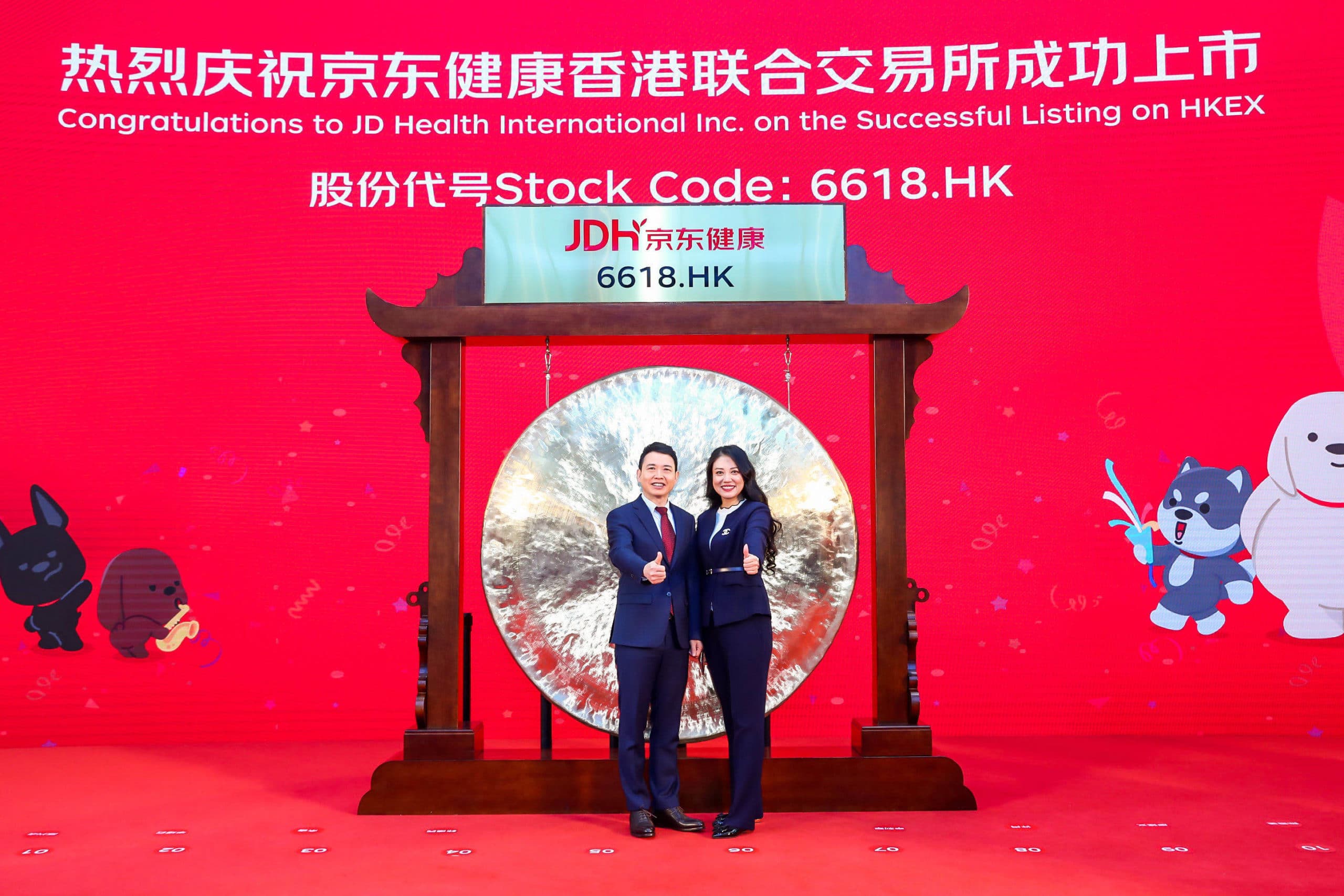
From Left to right: Lijun Xin, CEO of JD Health, Dongyuan Wang, General Manager of JD Health’s Intelligent Medical Services at Celebration Ceremony to Mark JD Health’s Successful Listing on HKEX
All of her accomplishments at JD Health are the result of her past experiences, which paved a way for her entry into the healthcare industry, even starting from the time when she was only a little girl.
“I always believed it was my fate to enter into the healthcare industry,” said Wang.
Finding Inspiration
Wang was born in the northeastern Chinese city in Heilongjiang. Her father was a dentist who later operated an offline pharmacy that was the first of its kind in the city. Recalling the memories of her childhood, Wang seemed to realize that everything was arranged by fate.
“I helped my parents to take care of the business in the store if they were caught up in other things,” said Wang. “So in a way, I can say I’ve been involved in the medical industry since I was only 9 years old.”
She joined IBM’s big data analysis product line, accumulating nearly 15 years of working experience related to information technology, offering solutions to various of organizations including hospitals and medical institutions.
In 2016, the computer program AlphaGo sealed a 4-1 victory over Go grandmaster Lee Sedol, in an unexpected victory that reinforced Wang’s belief in the power of technology to change the world.
“Previous to that victory, I would never have imagined that technology could surpass human beings,” Wang said. “I realized that we had underestimated the power of technology. Suddenly I saw the full scope of potential.”
Dongyuan Wang at Panel Discusson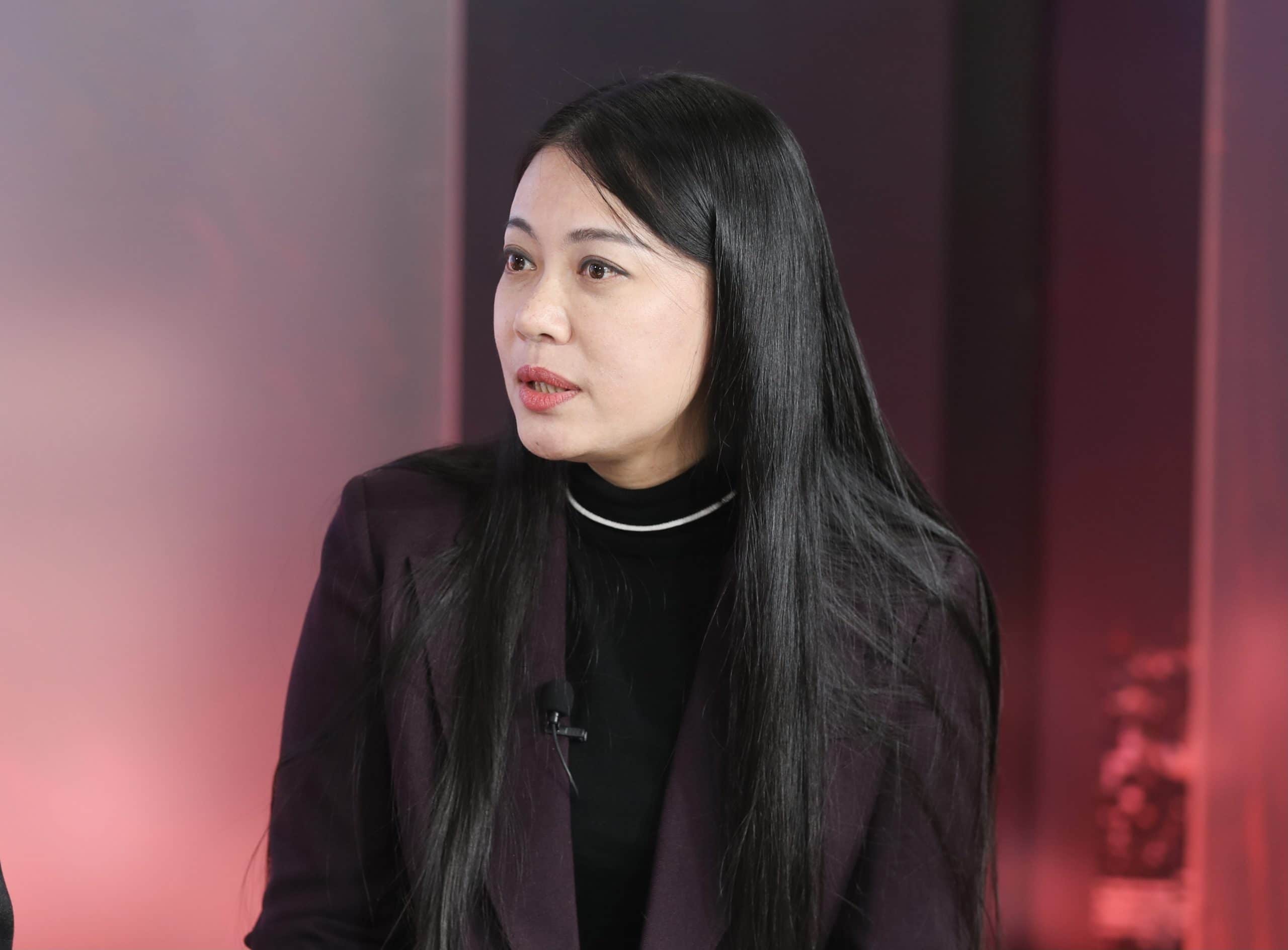
Dongyuan Wang at Panel Discusson
Paving Her Own Path
In 2016, Wang started her own business with partners, providing intelligent healthcare solutions to hospitals and medical institutions.
Running a business comes with many challenges. During her first three years of entrepreneurship, Wang never took a weekend off, and she did everything herself, from equity allocation to talent recruitment. In order to recruit as many talents as possible, she visited more than 10 colleges and universities by herself in a year and patiently introduced her business to students again and again. She was eager for knowledge, which helped her deal with the intensity of the work load and various new challenges.
“I always believed that there was a lot for me to learn,” Wang said. “Setting up our own business brought me back to the beginning of my life journey,” she said, recalling her early years working for her family drugstore.
Over three years of entrepreneurship, she was and studying for an EMBA program at the same time. She remembered working with and learning from frontline physicians to enrich her clinic experiences; and also learned from IT engineers how to mark each gastroscopy image to assist with the computer’s machine learning.
She recalled a fond memory of cooperation in 2017 with a renowned general hospital in Shanghai, Ruijin Hospital, on the precision of medication for children with Acute promyelocytic leukemia (APL), the M3 subtype of acute myeloid leukemia (AML) subtype. Arsenic trioxide is helpful in controlling the M3 subtype of AML, and can effectively control the progression of the disease. It is widely used in clinical applications, but arsenic trioxide is highly toxic and potentially life-threatening if it is taken in the wrong dosage. Through in-depth research with professional doctors and technicians, she found that technology could provide doctors with guiding doses of medication, ensuring the safety of sick children.
Wang’s experience with entrepreneurship enabled her to grow quickly in the medical industry while also making her better understand the difficulty for a small start-up to achieve big changes.
“Only companies with a sound business foundation of infrastructure, updated information system and extensive logistics network have the ability to make changes to the industry. JD is one of the companies that I believed to have strong technical and platform capabilities,” said Wang.
In 2018, after three rounds of discussions with Xin, she decided to join JD because of its platform advantages, technology strength and logistics capabilities.
Intelligent Healthcare
“The country always want more people to have access to better quality health care services while spending less money. But the reality is that only a small proportion of people can afford to enjoy better quality services because it currently requires spending more money,” said Wang.
“The only way to solve this challenge is to carry out technological innovation, through which we can expand our services to lower-tier cities, thus improving the local medical professionalism, and lowering the misdiagnosis rate.”
Wang herself has encountered such an example of misdiagnosis in a lower-tier city. A few years ago Wang’s mother was diagnosed with a serious disease, Lupus Erythematosus, in her hometown hospital. Her family members panicked, so they chose to come to one of Beijing’s hospitals, Peking Union Medical College Hospital, for a second opinion. Unexpectedly, the Beijing hospital declared a different diagnosis: her mother did not have the disease. Her mother remains healthy today.
“The misdiagnosis rate in lower-tier cities is rather high, and many people have missed the best time for treatment. or had over treatments or even malpractices because of misdiagnosis,” said Wang.
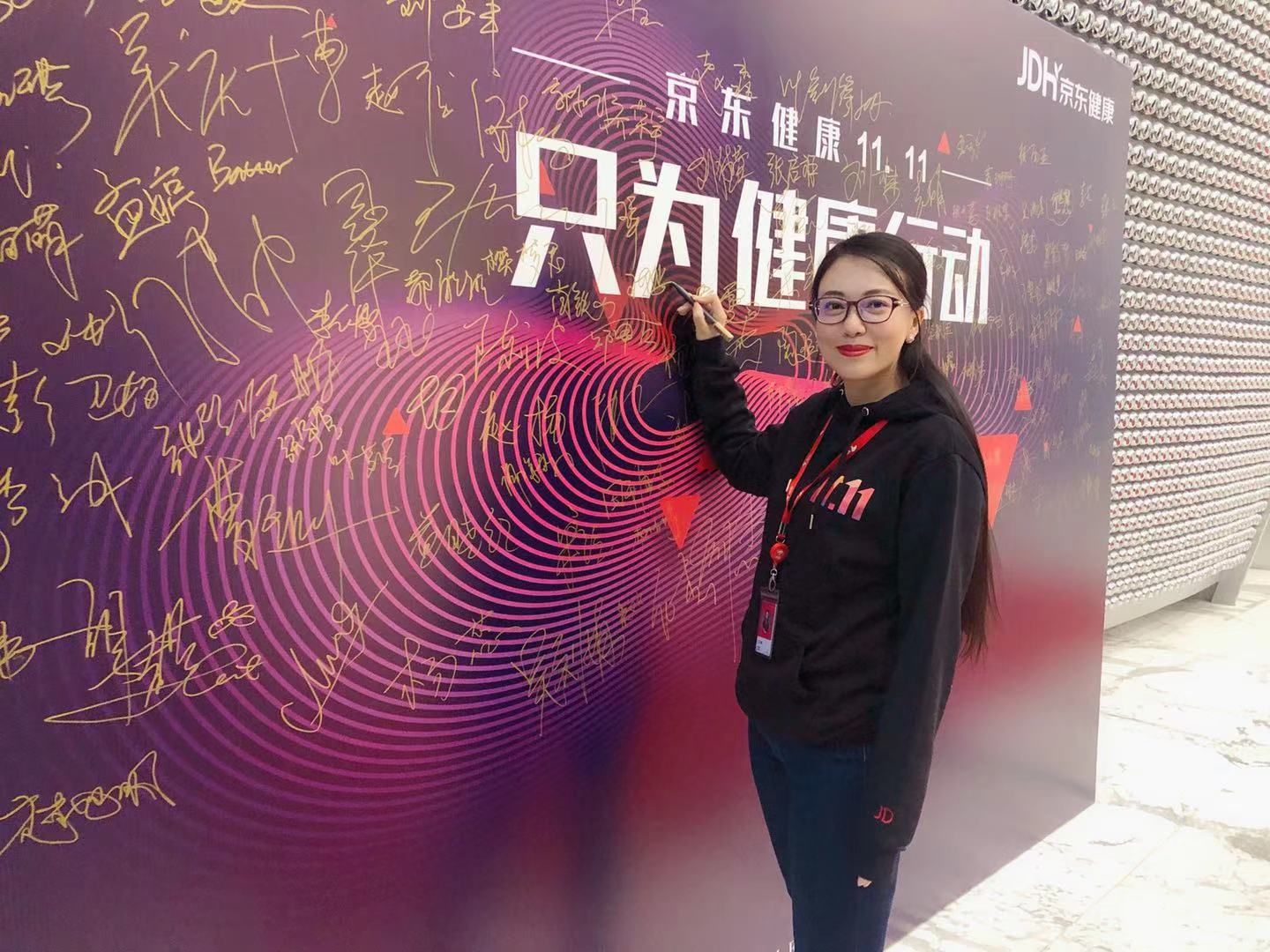
Dongyuan Wang at JD Headquarters in Beijing
On the subject of foreign diagnosis systems, such as IBM’s Watson, Wang believes that the reason for its ability to output correct and standard diagnosis answers is because the machine has been subjected to a rigorous and deep learning process. Wang believes that such products would be of great help in improving the diagnosis in China’s.
“Assisted diagnosis and treatment is one of the developmental directions in the future, especially for people in lower-tier cites. The first thing I came to JD to do is to make a system that can assist in prescribing rational drug use. Through the system, I hope people can find the right drugs, which are safe, effective and affordable,” said Wang.
She has also led her team to create an AI-based prescription review and analysis system, titled the PharmCOO (“Pharma chief operating officer”), which optimizes the clinical prescription process and improves patient safety. Using JD’s advanced natural language processing and deep learning technology, PharmCOO can provide doctors timely reminders on any issues, and consultation on the use of various drugs. Rather than a static database, the knowledge graph-based system is unique in that it also constantly learns from the experience of medical professionals, enabling it to improve accuracy, and taking the burden off of pharmacists to memorize troves of medical data so that they can focus on their work. It is already being applied in hospitals in Beijing, Hebi of Henan province and other cities.
In addition to developing this technological system, Wang also led her team to assist Beihai of Guangxi Zhuang Autonomous Region and several other cities in Jiangsu province, in the construction of “Health City” projects. JD gives full play to its supply chain and technical capabilities, and cooperates with the government, hospitals and communities to carry out medical services and health management to build a digital intelligence health ecosystem. At the same time, JD empowers lower-tier cities with the digitalization of medical systems, thus further improving the efficiency of medical supply chain in lower-tier cities.
“Every project I’ve done may seem to have a halo from the outside, but in fact, these projects have been an ordeal for me. JD Health’s first annual financial results were released in March, and mentioned JD Health’s efforts in helping Beihai to build a ‘Health City’. I was almost in tears when I saw the project I led mentioned in the financial results. It was my contribution to not only JD Health, but also to lower-tier cities such as Beihai and Hebi. No one else knows how much we struggled to make it happen; only my team and I know all the hardships we endured in order to facilitate cooperation like this,” said Wang.
In March 2020, when the pandemic was still in serious condition and basically everyone was still at home in quarantine, Wang traveled to Beihai in order to promote the implementation of the Health City Project.
Accompanied by a young colleague on her team, she faced more than 20 government officials, including mayor, vice mayors, officials from health care commission and health insurance bureau, to present them the proposal and persuade them to join the project. Faced with the new cooperation model, the mayor questioned her for nearly 40 minutes, repeatedly questioning the function and effectiveness of the business model. Eventually, with Wang’s steady and professional response, Beihai city agreed to join JD Health’s Health City project.
Following her Fate
Wang mentioned that she will continue to explore ways of using technology to improve conditions in the healthcare industry over the next 5-10 years.
“We can undoubtedly improve China’s grassroots healthcare capability and reduce the misdiagnosis rate through technological innovation,” said Wang.
“Healthcare is my fate, and I would give anything for it.”

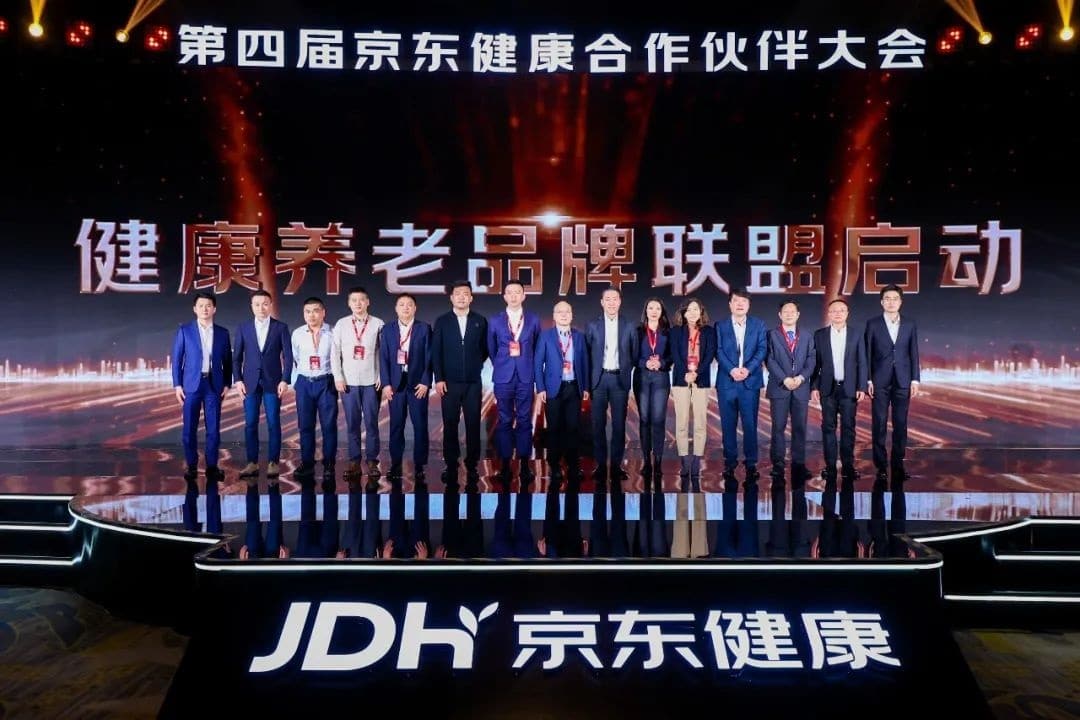
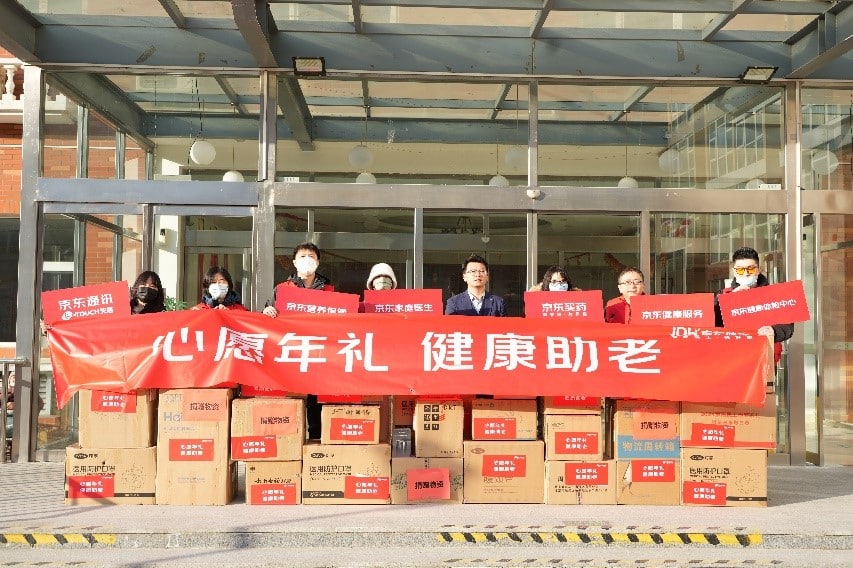
 JD Data: Three Key Findings from JD’s Reading Report
JD Data: Three Key Findings from JD’s Reading Report
